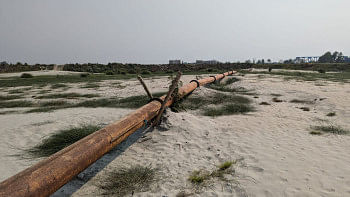Govt plans compliance platforms like Accord, Alliance: Salman
The government is planning to form inspection and remediation platforms like Accord and Alliance to strengthen workplace safety in industrial units which produce goods for the domestic markets, said Salman F Rahman, adviser to the prime minister on private industries and investment.
The Accord and Alliance, two foreign inspection and remediation platforms, were formed to strengthen workplace safety in the garment sector after the Rana Plaza building collapse in April 2013.
However, the safety standard of the non-RMG factories and industries is still poor as those units have not been inspected by any credible agency and the Hashem Foods fire incident has exposed the scenario.
Compliances to international standards and safety measures in the domestic industries are largely ignored as there is no pressure from the international communities like that in the garment sector.
"We will involve the Federation of Bangladesh Chambers of Commerce and Industry (FBCCI) on formation of the inspection and remediation platforms," said Rahman.
He was addressing a webinar on "reviving the leather sector in the aftermath of Covid 19", jointly organised by Economic Reporters Forum (ERF), The Asia Foundation (TAF) and RAPID.
Regarding the construction of a central effluent treatment plant (CETP) at the Savar Tannery Industrial Estate (STIE), Rahman said despite having a wrong design, it was somewhat operational now.
Hinting at a Balancing Modernisation Rehabilitation and Expansion under public-private partnership, he said the Bangladesh University of Engineering and Technology was involved in improving the CETP but it let the CETP and the country down.
Syed Manzur Elahi, chairman of Apex Footwear, spoke on forming a powerful taskforce to address challenges in the leather sector.
"The time has come for an action plan. A taskforce should be formed with representation from different stakeholders," he said.
A lot of discussions and seminars have been held on development of the leather sector and CETP over many years but still very little has been done, said Elahi, also an adviser to a former caretaker government.
The taskforce will hold at least one meeting a month to formulate a roadmap for the leather sector," he said.
This is because if Bangladesh wants to export more leather and leather goods, the country will have to ensure compliance, said Elahi, an experienced entrepreneur in the leather sector.
As business of leather and leather goods for Bangladesh gains momentum, export is increasing even during the time of the pandemic, said Syed Nasim Manzur, managing director of Apex Footwear.
However, compliance is needed if Bangladesh wants to do business, he said, adding that global trade declined by 10 per cent but the trade of leather and leather goods has declined by 22 per cent.
Leather and leather goods export from Bangladesh increased by more than 18 per cent year-on-year to $941 million last fiscal year.
However, a nearly 300 per cent rise in freight charge and crisis of container vessels have been hurting the shipment of goods from Bangladesh, he said, adding that it took more than three weeks to send a shipment from Dhaka to the US even by air.
Every day the trade of leather and leather goods across the world amounts to $1 billion and Bangladesh is becoming a potential supplier in this trade, he said.
The annual trade of leather and leather goods business will reach $530 billion by 2027, Manzur also said.
Bangladesh needs a Leather Working Group (LWG) certification for grabbing a bigger market share of the global leather and leather goods business, he said.
While presenting one of three keynote papers, MA Razzaque, chairman of the Research Policy Integration for Development (RAPID) said global brands like Nike, Puma and Adidas have been shifting work orders from China to other countries and Bangladesh could take up this opportunity to generate business.
Shaheen Ahmed, president of the Bangladesh Tanners Association, sought completion of the construction of the CETP as soon as possible.
He also sought a handsome amount of bank loans to be made available for the purchase of rawhide during the upcoming Eid-ul-Azha.
Commerce Secretary Tapan Kanti Ghosh said the CETP was supposed to be completed by December 2019 but unfortunately it was not done yet.
"It would have been good if we could construct a CETP of European standard for the leather and leather goods sector," he said.
ERF President Sharmeen Rinvy chaired the event while ERF General Secretary SM Rashidul Islam moderated the event.

 For all latest news, follow The Daily Star's Google News channel.
For all latest news, follow The Daily Star's Google News channel. 



Comments